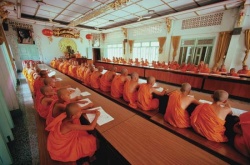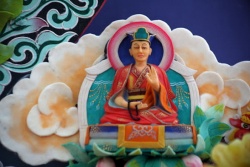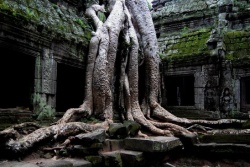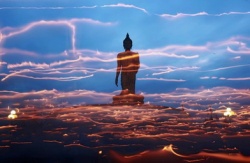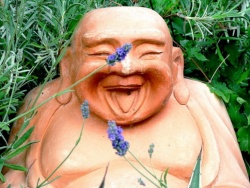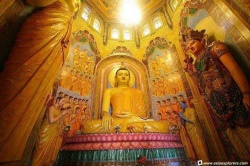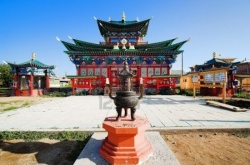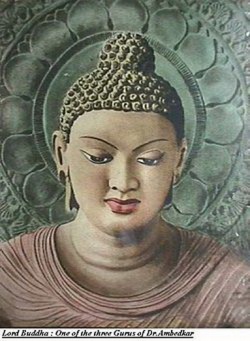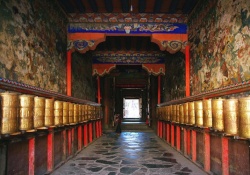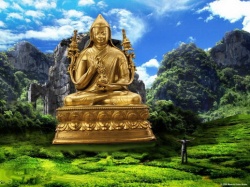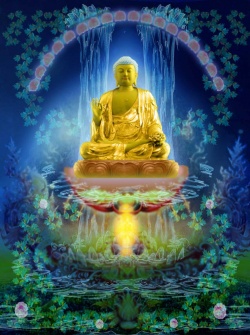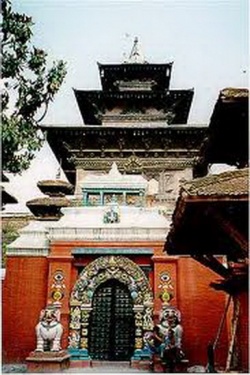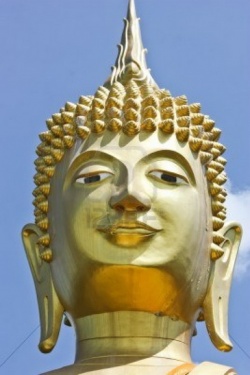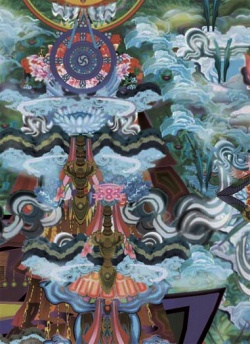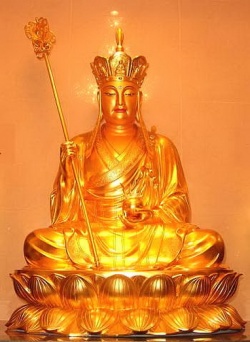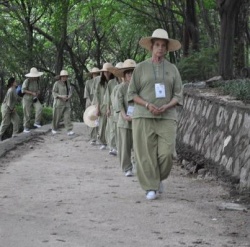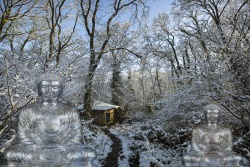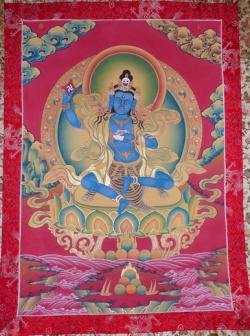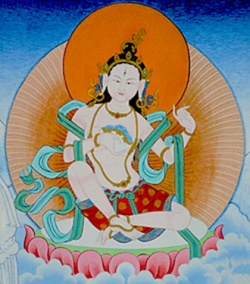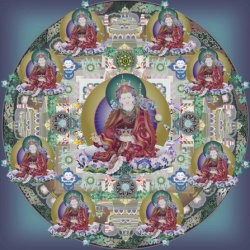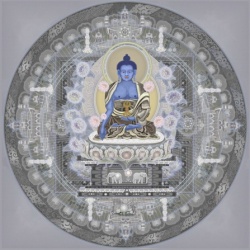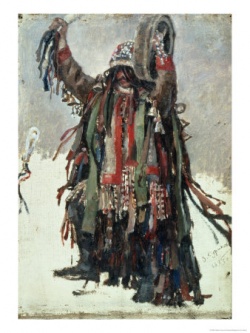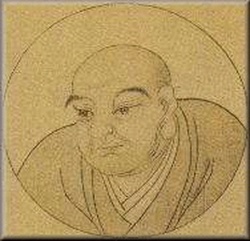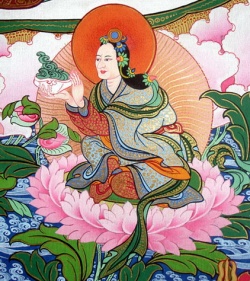The Penitent Thief trans.by Albert J. Edmunds
Jump to navigation
Jump to search
- Middling Collection, Dialogue No. 86.
- Luke xxiii. 39-43.--And one of the malefactors which were hanged railed on him, saying, Art not thou the Christ? save thyself and us. But the other answered, and rebuking him said, Dost thou not even fear God, seeing thou art in the same condemnation? And we indeed justly; for we receive the due reward of our deeds: but this man hath done nothing amiss. And he said, Jesus, remember me when thou comest in thy kingdom. And he said unto him, Verily I say unto thee, To-day shalt thou be with me in Paradise.
- John iii. 5.--Jesus answered, Verily, verily, I say unto thee, Except a man be born of water and the Spirit, he cannot enter into the kingdom of God.
- Mark ii. 5.--And Jesus seeing their faith saith unto the sick of the palsy, Son, thy sins are forgiven.
- Cf. also Eusebius H. E. iii. 23 (the story of the Apostle John pursuing and converting the robber).
- Thus have I heard. At one season the Blessed One was staying at Sâvatthi, in the Conqueror's Grove, the cloister-garden of the Feeder of the Poor. And at that season there was a robber named Finger-garland (Angulimâlo) in the realm of Pasenadi, the p. 629 King of Kosalâ; and he was barbarous, red-handed, devoted to killing and slaughter, unmerciful to all who live. By him towns, villages, and districts were made as though they had never been. He slew men all the time, and wore a garland of their fingers.
- Now the Blessed One, having dressed betimes, took his bowl in his robe, and went to Sâvatthi for alms. When he had gone round it, and had returned from the quest of alms in the afternoon, he rolled up his mat, took his bowl in his robe, and entered upon the high road where Finger-garland the robber was. Then the herdsmen, cattle-tenders, and farmers, who were working, saw the Blessed One going thither, and called to him: "O philosopher! Go not upon that road; for a robber named Finger-garland is thereon, who is barbarous, red-handed, devoted to killing and slaughter, unmerciful to all who live. By him towns, villages, and districts are made as though they had never been. He slays men all the time and wears a garland of their fingers. O philosopher, men go upon this road only in companies of ten, twenty, thirty, or forty; and they go armed for fear of Finger-garland the robber."
- When they had said this, the Blessed One went on his way in silence. And a second and a third time they said so, but still the Blessed one went on his way in silence.
- Now Finger-garland the robber saw the Blessed One coming from afar, and seeing him he thought to himself: "This is wonderful, this is marvellous: men go upon this road only in companies of ten, twenty, thirty, or forty, and they go armed for fear of me; but this philosopher, it seems, is alone, without any one, open to attack. What if I now take the life of this philosopher?" Then Finger-garland the robber took his sword and shield, got bow and quiver ready, and walked behind the Blessed One. But the Blessed One put forth such an effort of psychical power that Finger-garland the robber, going with all his might, could not overtake the Blessed One going by his inner force (pakati). So the robber thought to himself: "This is wonderful, this is marvellous: hitherto I have chased and caught an elephant running, a horse, a chariot, or a deer; but now, going with all my might, I cannot overtake this philosopher going by his inner force." He stood and said to the Blessed One: "Philosopher, stand! Philosopher, stand!"
- "I am standing, O Finger-garland; stand thou also!"
- Then Finger-garland the robber thought to himself: "These Sâkya philosophers tell the truth and keep their promises. And yet this philosopher, even while he is going, says, 'I am standing, O Finger-garland; stand thou also!' What if I now ask him [what p. 630 he means]?" Then the robber addressed the Blessed One with a stanza:
- "Philosopher, thou sayest, 'I am standing,' while thou art going, and thou callest me standing when thou art not so;
- "I ask thee, philosopher, this question: How art thou standing when I am not standing?"
- "Long has the great Seer (Isi),1 this philosopher debating in the great Wood, been revered by me;
- "Even thus does a robber resemble2 a sword or a weapon at the pit and precipice of hell."
- The robber bowed at the feet of the Auspicious One, and begged of him ordination on the spot.
- Now the Blessed One, with Finger-garland for an attendant philosopher, went on his journey towards Sâvatthi and in due time arrived there; and there the Blessed One stayed at Sâvatthi, in the Conqueror's Grove, the cloister-garden of the Feeder of the Poor. Now at that season a great crowd collected at the palace-gate of Pasenadi, the King of Kosalâ, and there went up a hue and cry: "Your Majesty, there is a robber in your realm named Finger-garland, who is barbarous, red-handed, devoted to killing and slaughter, unmerciful to all who live. By him towns, villages, and districts are made as though they had never been. He slays men all the time, and wears a garland of their fingers. Let your Majesty arrest him."
- Now Pasenadi, the King of Kosalâ, departed that day from Sâvatthi with some five hundred horses and proceeded to the cloister-garden. He went by chariot as far as the ground was passable for chariots, and then alighted, and went on foot to where the Blessed One was. Going up to the Blessed One, he saluted him and sat p. 631 respectfully on one side. While he so sat, the Blessed One said to him: "O great King, is Seniyo Bimbisâro, the King of Magadhâ, provoked at you, or the Licchavi [[[Wikipedia:clan|clan]]] of Vesâli, or other rival Kings?"
- "Nay, Lord: none of these Kings are provoked at me. But, Lord, there is in my realm a robber named Finger-garland, who is barbarous, red-handed, devoted to killing and slaughter, unmerciful to all who live. By him towns, villages, and districts are made as though they had never been. He slays men all the time and wears a garland of their fingers. Lord, I fear I shall not arrest him."
- "But, great King, if you saw Finger-garland with his hair and beard cut off, having put on the yellow robes and gone forth from domestic life into the homeless one; abstaining from taking life, from theft, and from lying; eating one meal a day, chaste, moral, with a glorious religion,--what would you do to him?"
- "Lord, we should salute him respectfully, or rise in his presence, or offer him a seat, or present him with robe and alms-bowl, lodging-place, the requisites for sickness, medicine and conveniences; and we should appoint for him the protection, toleration, and defence that are due to religion.1 But, Lord, how could there be such moral restraint in an immoral, wicked man like him?"
- Now at that time the venerable Finger-garland was sitting not far from the Blessed One. Then the Blessed One, stretching out his right arm, said to Pasenadi, the King of Kosalâ: "This, great King, is Finger-garland!"
- Then the King was seized with fear, consternation, and horror, and the Blessed One, seeing him afraid and agitated with horror, said to him: "Fear not, great King, fear not; there is nothing for you to fear any more." So the King, who had been terrified, became calm again, and went up to Finger-garland, saying to him: "Surely your Reverence is not Finger-garland?"
- "Yes, great King."
- "Great King, my father is a Gaggo, and my mother a Mantânî."
- "May it please your Reverence Gaggo-Mantânî-son, I shall supply you with robe and alms-bowl, with a mat to sit and sleep p. 632 on, and with the requisites for sickness, medicine and conveniences."
- But at that season the venerable Finger-garland was a forest-dweller, with an alms-bowl, and wearing three robes taken from dust-heaps. So he said to the King: "Enough, great King: three robes are my full outfit."
- Then Pasenadi, the King of Kosalâ, approached the Blessed One, saluted him respectfully, and sat on one side. And so sitting, the King said to the Blessed One: "Wonderful, O Lord! Marvellous, O Lord! is it even until now, O Lord Blessed One: men are tamed among the untamed, pacified among the unpacified, and among those who have not attained, they are brought to Nirvâna (literally, extinguished among the non-extinct). He, Lord, whom we could not tame by staff or sword, is tamed by the Blessed One without staff and without sword. But now, Lord, we must go: we have much to do, much business on hand."
- "Just as you think fit, great King."
- So Pasenadi, the King of Kosalâ, rose from his seat, saluted the Blessed One respectfully, and keeping him on his right hand, departed.
- Then the venerable Finger-garland, having dressed betimes, took bowl in robe and went into Sâvatthi for alms. And going through Sâvatthi from house to house for alms, he saw a woman in the agonies of travail, and thereupon thought to himself: "Alas, how beings suffer; alas, how beings suffer!"
- Now the venerable Finger-garland, having gone to Sâvatthi for alms and returned in the afternoon, approached the Blessed One, saluted him, and sat as usual, and said: "Lord, to-day on my begging rounds in Sâvatthi, while I went from house to house, I saw a woman in the agonies of travail; whereupon I thought to myself: 'Alas, how beings suffer; alas, how beings suffer!'"
- "Well now, Finger-garland, go to Sâvatthi, go up to that woman and say this: 'Since I was born, sister, I do not remember that I ever purposely took the life of anything that breathes. By this truth be there safety to thee and safety to thy womb.'"
- "But, Lord, that would surely be for me a deliberate lie: by me, Lord, have many breathing things been reft of life."
- "Well, then, Finger-garland, go to Sâvatthi, approach that woman and say: 'Sister, since I was BORN OF THE NOBLE BIRTH' I do not remember that I ever purposely took the life of aught that breathes. By this truth be there safety to thee and safety to thy womb."
- p. 633
- "Even so, Lord," said the venerable Finger-garland, in assent unto the Blessed One; and going into Sâvatthi, he approached that woman and said: 'Sister, since I was BORN OF THE NOBLE BIRTH I do not remember that I ever purposely took the life of aught that breathes. By this truth be there safety unto thee and safety to thy womb."
- Whereupon there was safety unto that woman, and safety to her womb. And forthwith the venerable Finger-garland, dwelling alone, retired, earnest, ardent, and strenuous, for a little time, realised by his own supernal Knowledge, and even in this world, that incomparable goal of the religious life, for the sake whereof do veritable gentlemen go forth from the domestic life into the homeless one: he perceived that birth was destroyed, the religious life was lived, and duty done, and for this existence there was naught beyond. And so the venerable Finger-garland became one of the Arahats.
- Now the venerable Finger-garland, having dressed betimes, took bowl in robe, and went to Sâvatthi for alms; and on one occasion a clod of earth was thrown and hit his person; upon another occasion a stick, and yet again a stone. Then the venerable Finger-garland, with his head broken and the blood flowing, his bowl broken and his robe rent, approached the Blessed One. And the Blessed One saw him coming from afar, and said to him: "Bear up, O Brâhman, bear up! You are feeling in this world the effect of some deed for which you would have been tormented in hell for many years, for many hundreds and thousands of years."
- Then the venerable Finger-garland, when secluded and solitary, felt the bliss of deliverance, and on that occasion gave vent to the following Udâna:
- [The Dialogue ends with a page of verse. The words italicised are important. This is the doctrine of the forgiveness of sins. To the Arahat all the past is wiped away, and he only suffers such physical effects of evil as those described; but no retribution can follow him beyond the grave.]
- Footnotes
- p. 628
- 1. There is a corrupt version of this story in Spence Hardy, translated from mediæval Ceylon sources, but the present is its first translation from the Pâli. Its antiquity is attested by the Pâli Great Chronicle, which tells us that it was sculptured, together with other leading stories from Buddha's life, upon the great Tope at the capital of Ceylon, in the second century B.C. The sculptures of similar scenes at Bharhut and Sânci forbid our rejecting the Chronicle's list of Ceylon sculptures as fiction. [Owing to lack of time, the proofs of the present article have not been read by the author.-Ed.]
- p. 630
- 2. Anvakârî.
- p. 631
- 1. Rhys Davids translates the same phrase in the Long Collection thus: "watch and ward and guard, according to the law." The "or" in our present translation of this paragraph arises from a difference in the text.
- Monks, I do not perceive another single individual who keeps up the incomparable empire of religion set going once for all by the Tathâgato, excepting Sâriputto.
- Sâriputto, O monks, keeps up the incomparable empire of religion set going once for all by the Tathâgato.
- {3} NUMERICAL COLLECTION V. 132.
- Monks, the eldest son of a king who is a world-ruler (Cakkavatti) is endowed with five attributes, and keeps up the empire (lit., keeps the wheel rolling) set going by his father by righteousness alone: that is the wheel which cannot be turned back by any human being, by any hostile hand.
- What are the five attributes?
- In this world, monks, the eldest son of a king who is a world-ruler p. 44 is worldly-wise, and spiritually wise, temperate, wise in the times, and wise in the assemblies.
- Monks, the eldest son of a king who is a world-ruler is endowed with these five attributes, and keeps up the empire set going by his father by righteousness alone: that is the wheel that cannot be turned back by any human being, by any hostile hand.
- Exactly thus, monks, does Sâriputto, with five qualities (dhammas) endowed, keep up the incomparable empire of religion, set going once for all by the Tathâgato: that is the wheel that cannot be turned back by philosopher or brahmin, angel or Tempter, arch-angel, or any one in the world.
- What are the five qualities?
- In this case, monks, Sâriputto is worldly-wise, spiritually wise, temperate, wise in the times and wise in the assemblies.
- With these five qualities endowed, monks, does Sâriputto keep up the incomparable empire of religion set going once for all by the Tathâgato: that is the wheel that cannot be turned back by philosopher or brahmin, angel or Tempter, archangel, or any one in the world.
- {4} SUTTA NIPÂTO 557.
- The wheel set rolling by me--
- Religion's incomparable wheel--
- Sâriputto keeps rolling,
- [He] the fellow of the Tathâgato.
- SAVING POWER OF BELIEF.
- Mark ix. 23. Jesus said unto him, If thou canst! All things are possible to him that believeth.
- Cf. John iii. 18, and the New Testament throughout.
- {5} NUMERICAL COLLECTION I. 17.
- Monks, I do not perceive another single quality whereby beings, upon the dissolution of the body after death, rise again in states of suffering, woe, destruction and hell, to be compared, O monks, to false belief.
- Beings, possessed of false belief, O monks, upon the dissolution of the body after death, rise again in states of suffering, woe, destruction and hell.
- Monks, I do not perceive another single quality whereby beings, upon the dissolution of the body after death, rise again in the world of weal and paradise, to be compared, O monks, with Right Belief.1
- p. 45
- Beings, possessed of Right Belief, O monks, upon the dissolution of the body after death, rise again in the world of paradise.
- THE LOGIA.
- JESUS SAITH is the formula in the Egyptian Logia-fragment found in 1897 {Greek fragments of The Gospel of Thomas}, and of frequent occurrence in the Gospels. The ancient Christian Logia-Book, or primitive Gospel of Matthew mentioned by Papas (Eusebius, H. E. iii. 39) is lost; but the Buddhists are more fortunate in having their Logia-Book extant. It is called the ITIVUTTAKA, that is, the Thus-Said. Its antiquity is attested not only by the internal evidence of terseness and simplicity, but by the external evidence that the name itself is one of the ancient Nine Divisions of the Scriptures which antedate the present arrangement of the Pâli Canon. The formulæ of the Itivuttaka are the following:
- 1. This was said by the Blessed One, said by the Holy One, and heard by me:
- 2. This is the meaning of what the Blessed One said, and here it is rendered thus [in verse].
- 3. Exactly thus is the meaning spoken by the Blessed One, and thus it was heard by me.
- These three formulæ accompany each of the first 79 paragraphs (suttas) of the Itivuttaka; No. 80 has the first two formulæ only; Nos. 81-88 have none of them; Nos. 89 and 90 have all; Nos. 91-98 have none; Nos. 99 and 100 have all; Nos. 101-111 have none; the closing sutta, No. 112, has all three. Five of the suttas that want the formulæ (Nos. 101, 105, 108, 110, 111) are found in the Numerical Collection, as well as two where they have been supplied (Nos. 90 and 112). It is therefore probable that the original Itivuttaka has been added to, and this is borne out by the fact that the suttas increase in length towards the end. Moreover, the suttas borrowed from the Numerical Collection all occur after No. 80, where the formulæ cease to be regular.1
- The earlier part of the Itivuttaka appears to be of great antiquity. Its themes are found all through the Canon in a more developed form, but they are here expressed with a terse simplicity and with the solemn deposition in each case that Buddha spoke them.
- A late expansion of this discourse is given by Warren, in his Buddhism in Translations, from Buddhagosha's Way of Purity, a Pâli compendium of the fifth Christian century.2 When Warren wrote, the Pâli original had not as yet appeared in the edition of the Pâli Text Society, which is printed in Roman letters.
- It is well known to New Testament scholars that the great Eschatological Discourse in the Synoptical Gospels (i.e., the Sermon on the Last Things, delivered upon the Mount of Olives) is a blending of historical and spiritual vaticination. As I pointed out in 1893,3 the Evangelist Luke attempted to separate the spiritual prophecy from the historical prediction, putting the former into his seventeenth chapter, and the latter into his twenty-first. But Luke evidently understood even the physical cataclysm to refer to the siege of Jerusalem and the destruction of the Hebrew State. Even Mark and the editor of Matthew probably understood the same thing, though our English translations of Matthew make his "consummation of the æon" the "end of the world." After the siege, the early Christians evidently made this Eschatological Discourse refer to a cosmical convulsion. But the only words which can justly apply to such a thing are those in all three of the Synoptists: "Heaven and earth shall pass away, but my words shall not pass away."4 We have therefore used this verse among our parallels to Buddha's present discourse, but have reserved the text of the Gospel prophecy for a forthcoming translation from the famous Anâgata-bhayâni, selected by Asoko among his favorite texts. Its subject is the decline of religion.
- p. 429
- THE END OF THE WORLD.
- 2 Peter iii. 10. But the day of the Lord will come as a thief; in the which the heavens shall pass away with a great noise, and the heavenly bodies (or elements) shall be dissolved with fervent heat, and the earth and the works that are therein shall be burned up (or, discovered).
- Rev. xxi. 1. And I saw a new heaven and a new earth: for the first heaven and the first earth are passed away; and the sea is no more.
- NUMERICAL COLLECTION VII. 62.
- Thus have I heard. At one season the Blessed One was staying at Vesâli, in Ambapâli's grove. And the Blessed One addressed the monks, saying: "Monks!" "Lord!" answered those monks, in reply to him. The Blessed One spake thus:
- "Impermanent, O monks, are the constituents of existence, unstable, non-eternal: so much so, that this alone is enough to weary and disgust one with all constituent things, and emancipate therefrom. Sineru, monks, the monarch of montains, is eighty-four thousand leagues1 in length and breadth; eighty-four thousand lagues deep in the great ocean, and eighty-four thousand above it.
- Now there comes, O monks, a season when, after many years, many hundreds and thousands and hundreds of thousands of years, it does not rain; and while it rains not, all seedlings and vegetation, all plants, grasses, and trees dry up, wither away and cease to be. Thus, monks, constituent things are impermanent, unstable, non-eternal: so much so, that this alone is enough to weary and disgust one therewith and emancipate therefrom.
- And, monks, there comes a season, at vast intervals in the lapse of time, when a second sun appears.
- After the appearance of the second sun, monks, the brooks and ponds dry up, vanish away and cease to be. So impermanent are constituent things! And then, monks, there comes a season, at vast intervals in the lapse of time, when a third sun appears; and thereupon the great rivers: to wit, the Ganges, the Jamna, the Rapti, the Gogra, the Mahî,--dry up, vanish away and cease to be.
- At length, after another vast period, a fourth sun appears, and thereupon the great lakes, whence those rivers had their rise: namely, Anotatto,2 Lion-leap, Chariot-maker, Keel-bare, Cuckoo, Six-bayed, and Slow-flow, dry up, vanish away, and cease to be.
- p. 430
- Again, monks, when, after another long lapse, a fifth sun appears, the waters in the great ocean go down for an hundred leagues; then for two hundred, three hundred, and even unto seven hundred leagues, until the water stands only seven fan-palms' deep, and so on unto one fan-palm; then seven fathoms' deep, and so on unto one fathom, half a fathom; waist-deep, knee-deep, ankle-deep. Even, O monks, as in the fall season, when it rains in large drops, the waters in some places are standing around the feet of the kine; even so, monks, the waters in the great ocean in some places are standing to the depth of kine-feet. After the appearance of the fifth sun, monks, the water in the great ocean is not the measure of a finger-joint. Then at last, after another lapse of time, a sixth sun appears; whereupon this great earth and Sineru, the monarch of mountains, reek and fume and send forth clouds of smoke. Even as a potter's baking, when first besmeared, doth reek and fume and smoke, such is the smoke of earth and mountains when the sixth sun appears.
- After a last vast interval, a seventh sun appears, and then, monks, this great earth, and Sineru, the monarch of mountains, flare and blaze, and become one mass of flame. And now, from earth and mountains burning and consuming, a spark is carried by the wind and goes as far as the worlds of God; and the peaks of Mount Sineru, burning, consuming, perishing, go down in one vast mass of fire and crumble for an hundred, yea, five hundred leagues. And of this great earth, monks, and Sineru, the monarch of mountains, when consumed and burnt, neither ashes nor soot remains. Just as when ghee or oil is consumed and burnt, monks, neither ashes nor soot remains, so it is with the great earth and Mount Sineru.
- Thus, monks, impermanent are the constituents of existence, unstable, non-eternal: so much so, that this alone is enough to weary and disgust one with all constituent things and emancipate therefrom. Therefore, monks, do those who deliberate and believe1 say this: 'This earth and Sineru, the monarch of mountains, will be burnt and perish and exist no more,' excepting those who have seen the path.
- FORMER RELIGIONS ECLIPSED BY THE RELIGION OF LOVE.2
- Matthew v. 17, 18, 43, 44. Think not that I came to destroy the law or the prophets: I came not to destroy, but to fulfil. For yerily I say unto p. 431 you, Till heaven and earth pass away, one jot or one tittle shall in no wise pass away from the law, till all things be accomplished.
- *
- Ye have heard that it was said, Thou shalt love thy neighbor, and hate thine enemy: but I say unto you, Love your enemies, and pray for them that persecute you.
- "In olden times, O monks, there was a religious teacher (or Master) named Sunetto, founder of an order, and free from indulgence in lusts; and he had several hundred disciples. The Master Sunetto preached to his disciples the doctrine of fellowship with the world of God; and those who understood all his religion in every way, when he preached this doctrine, were born again, upon the dissolution of the body after death, to weal in the world of God. Those who did not understand all his religion in every way, were born again, upon the dissolution of the body after death,--some into fellowship with those angels who transmute subjective delights into objective and share them with others;1 some into fellowship with the angels who delight in subjective creations; some into that of the angels of Content (Tusitâ); others with the Yâmâ; others again with the angels of the Thirty-three; others into fellowship with those of the Four Great Kings; and yet others into fellowship with Warrior magnates, Brahmin magnates, householder magnates.
- "Now Sunetto the Master, O monks, thought to himself: 'It is not fit that I should allow my disciples to have such destinies as these repeatedly: what now if I practise the Highest Love?' Whereupon, monks, the Master Sunetto practised Benevolence (or, love-meditation) for seven years, and for seven æons of consummation and restoration he did not return to this world.2 Yea, monks, at the consummation of the world3 he became an Angel of Splendor, and at the world's restoration he rose again in the empty palace of the Brahmâs. Yea, then, O monks, he was a Brahmâ, the Great Brahmâ (or, God), conquering, unconquered, all-seeing, controlling. And thirty-six times, O monks, was he Sakko, the lord of the angels; many hundreds of times was he a king, a righteous world-ruler and emperor, victorious to the four seas, arrived at the security of his country, and possessed of the seven treasures. Moreover, he had more than a thousand sons, heroes, of mighty frame, crushers of alien armies; he dwelt in this ocean-girt earth, p. 432 overcoming it, staffless and swordless, by righteousness. But even the Master Sunetto, though thus long-lived and long-enduring, was not emancipated from birth, old age, death, grief, lamentations, pains, sorrows, and despairs; I say he was not emancipated from pain. And why? Because of not being awake to four things (dhammâ), and not seeing into them. What four? The Noble Ethics, the Noble Trance (Samâdhi), the Noble Wisdom, and the Noble Release (or Emancipation). When these, O monks, known in their sequence and penetrated into,1 the craving for existence is annihilated, its renewal is destroyed: one is then reborn no more."
- Thus spake the Blessed One, and when the Auspicious One had said this, the Master further said:
- "These things are understood by the celebrated Gotamo,
- "Thus enlightened (buddho) by supernal knowledge, he told the doctrine to the monks.
- Footnotes
- p. 428
- 4. The second clause indicates the application of this verse: the passing of heaven and earth does not belong to the subject of the discourse, but is used as a standard whereby to gauge the perpetuity of the oracles of Christ.
- p. 429
- 2. I am not sure of the meaning of this word and its Sanskrit Equivalent Anavatapta, but it appears to mean "without warmth at the bottom."
- p. 430
- 1. Translation uncertain. The word saddhâtâ is not in Childers, and I can find no equivalent in Sanskrit; but the various reading, saddhâratâ, indicates the sense.
- 2. There is no break in the Pâli, but the present division is made for the sake of another Gospel parallel.
- p. 431
- 1. I have heen guided here by Warren, p. 289, and Lafcadio Hearn, Gleanings in Buddha-fields, p. 245.
- 2. See Itivuttaka 22, translated in April, 1900, where Gotamo relates the same of himself.
- 3. Itivuttaka has æon.
- p. 432
- 1. "Known in their sequence and penetrated into," represent the same words before translated: "being awake to," and "seeing into." So, again, "Pure Reason" (Pannâ), in the verse below, appears above as "Wisdom."
- NUMERICAL COLLECTION IV. 33.
- WHEN a Tathâgato arises in the world, an Arahat, a Buddha supreme, endowed with wisdom in conduct, auspicious, knowing the universe, a matchless charioteer of men who are tamed, a Master of angels and mortals, a Blessed Buddha, he preaches his religion, to wit, Personality (Sakkâyo), the origin of Personality, and the cessation thereof, and the path that unto that cessation goes. And, monks, those angels of long life, self-radiant, happy beings, abiding in the lofty mansions long, when they hear the preaching of the Tathâgato's religion, are everywhere seized with fear, astonishment, and trembling, saying: "Impermanent, alas! are we, O friend, 'tis said; and we thought we were permanent; unstable, and we deemed we were stable; non-eternal, who thought ourselves eternal. 'Tis said, O friend, that, we are impermanent, unstable, non-eternal, hedged about with personality!"
- Such, O monks, is the spiritual power of the Tathâgato over the angel-world; such his great authority and mystic might.1
- [In the Middling Collection, Sutta 49, Gotamo transports himself to the heaven of Brahmâ, to convert an angel from the heresy that his blest abode was p. 560 everlasting. There is also a story, found in the Sanskrit Divyâvadâna and other uncanonical sources,1 of Buddha going to the other world to preach the Gospel his mother. It is alluded to in the Pâli of Jâtaka 29, and is told in full in No. 483, but only in the commentary, not in the text. I will thank any scholar to find it in the Canon.]
- Dr. Carus has pointed out to me the significant fact that the preaching of the Gospel to the nations is a later addition to the New Testament. This is borne out by the archaic oracle in Matthew:
- "Go not into any way of the Gentiles, and enter not into any city of the Samaritans; but go rather to the lost sheep of the house of Israel. . . .Ye shall not have gone through the cities of Israel, till the Son of Man be come." (The Missionary Charge in Matth. 5, 6 and 23.)
- It is Luke alone who invents the mission of the Seventy (i.e., to the seventy nations of the world, according to Jewish geography). As we pointed out in April, 1900, there is a parallel here with the sixty-one Arahats sent forth by Gotamo. That Luke invented the story of the Seventy is betrayed by himself, for, in xxii. 35, he agrees with the Petrine and Matthæan tradition, in ascribing certain words to the Charge to the Twelve from which he has wrested them to make up his ideal Charge to the Seventy:
- "When I sent you forth without purse and wallet and shoes, lacked ye anything? And they said, Nothing."
- Luke puts the words, "no purse, no wallet, no shoes," into the Charge to the Seventy (x. 4), while in the Charge to the Twelve he reads: "nor wallet, nor bread, nor money; neither have two coats." But there is no mention of shoes. (Luke ix. 3.)
- In the Gospel tradition generally the great Missionary Charge is the one given after the resurrection:
- "Go ye therefore, and make disciples of all the nations, baptising them into the names of the Father and of the Son and of the Holy Ghost." (Matth. xxviii. 19.)
- The Trinitarian formula betrays the lateness of the redaction, but the passage is older than the redaction, for the substance of it is found in the Fourth Gospel: "Peace be unto you: as the Father hath sent me, even so send I you." (John xx. 21.) I have little doubt that the Matthæan charge read originally: "baptising them into my name," simply; to which Rendel Harris assented when I once pointed this out to him.
- p. 561
- As a Christian believer (though attached to no sect or Church whatever) I personally maintain that the post-resurrection missionary charge is no mere fiction introduced to imitate Buddhism (granting that even the catholic Luke knew thereof), but a reality. It is my conviction, after long research and thinking, that the Lord Jesus was vividly present, in some guise--whether palpable or visionary matters little--to his disciples after death, and especially to Peter. I believe too that he impressed their minds with his wishes, which had expanded since the days when he forbade ministrations to Samaritans and pagans. Unfortunately the account of the great appearance to Peter has been lost, if not suppressed by the Church. It probably contained the charge to Peter (misplaced in Matth. xvi.) and some matter relating to the descent into Hades mentioned in Peter's Epistle. But this leads us to the question of the lost ending of Mark, and is food for another article. I will only quote the proof-texts for an apparition to Peter:
- Mark xvi. 7: "Go, tell his disciples and Peter, He goeth before you into Galilee: there shall ye see him."
- (Cf. also Mark xiv. 28, fortified by the parallel in Matthew, but weakened by its omission in the Vienna Gospel-fragment from Egypt.)
- 1 Cor. xv. 5. "He appeared to Cephas."
- Luke xxiv. 34. "The Lord is risen indeed, and hath appeared to Simon."
- Eusebius, H. E. II. 1. Clement [of Alexandria) . . . . in the seventh book of [his Institutions] writes also thus:
- "The Lord transmitted the Gnosis unto James the Just, John and Peter after his resurrection."
- Shahahrastâni of Persia, A.D. 1150,
- "After he was dead and crucified, he returned, and Simon Peter saw him and He spake with him, and transmitted to him the power. Then he left the world and ascended into heaven, and Simon Peter was his representative." (Haar-brücker, Vol.I., p. 261.)
- Footnotes
- p. 559
- 1 It is this paragraph which led us to adduce the parallel in Matthew xxviii. 18.
- p. 560
- 1 I do not call the Divyâvadâna uncanonical merely because it is not in the Pâli Canon, but because it is post-Asokan. However, it doubtless contains a nucleus which we may call semi-canonical, for the Avadânas were classed by several sects in the Miscellaneous Pitaka, outside the great Collections of Agamas.
- MONKS, the following five future dangers (or, fears for the future), though not arisen now, will hereafter arise. Ye must be awake thereto, and being awake, must struggle to avert them. What are the five?
- Monks, there will be monks in the far future, wanting in physical, moral, emotional and intellectual control; and being so, they will confer Initiation upon others, and will not be able to train them in superior morals, emotions and intelligence. These, being also without the aforesaid control, will initiate others in their turn, who will keep up the same state of things. And so, monks, from corruption of doctrine [will come] corruption of discipline, and from corruption of discipline corruption of doctrine.
- This, monks, is the first future danger which, though not arisen now, will hereafter arise. Ye must be awake thereto, and being awake, must struggle to avert it.
- p. 685
- Again, monks, there will be monks in the far future, wanting in control as before, who being so will give asylum to others, and they will not be able to train them in superior morals, emotions and intelligence. These will give asylum to yet others, and so [there will be] more corruption of discipline from doctrine, and of doctrine from discipline.
- Again, monks, there will be monks in the far future without physical, moral, emotional and intellectual control, and being so, when they discourse upon the Higher Doctrine (Abhidhammo) and the Exegesis (Vedalla) they will not be awake, descending into doctrine dark.1 And so, monks, [there will be] corruption of discipline from corruption of doctrine, and corruption of doctrine from corruption of discipline.
- This, monks, is the third future danger which, though not arisen now, will hereafter arise. Ye must be awake thereto, and being awake must struggle to avert it.
- 2[Again], monks, there will be monks in the far future, [wanting in physical, moral, emotional and intellectual control; and they being thus wanting in physical, moral, emotional and intellectual control], there are Dialogues (Suttantâ) spoken by the Tathâgato,--deep, of deep meaning, transcendental, connected with the3 Void (or, classified under Void); and when these are recited they will not listen nor give ear nor present a heart of knowledge; and they will not study those doctrines, learn them, nor reflect thereon.
- But there are Dialogues poet-made, poetical, thrilling the heart, suggstive to the heart, the utterances of disciples who are outsiders. When these are recited they will listen, give ear, and present a heart of knowledge; these doctrines they will study, learn by heart and reflect upon.
- And so, monks, [there will be] corruption of discipline from corruption of doctrine, and corruption of doctrine from corruption of discipline.
- p. 686
- This, monks, is the fourth future danger which, though not arisen now, will hereafter arise. Ye must be awake thereto, and being awake, must struggle to avert it.
- Again, monks, there will be monks in the far future without physical, moral, emotional and intellectual control; and being so, the Presbyter monks will be luxurious, loose-lived, taking precedence by their descent, in seclusion neglecting their charge. They will not strive with their will for attainment of the unattained, approach to the unapproached, realisation of the unrealised. The last generation of them will fall into heresy, and will be luxurious, loose-lived, taking precedence by descent, in seclusion neglecting their charge. And so, monks, [there will be] corruption of discipline from corruption of doctrine, and corruption of doctrine from corruption of discipline.
- This, monks, is the fifth future danger which, though not arisen now, will hereafter arise, and which ye must be awake to, and so struggle to avert.
- These, monks, are the Five Future Dangers which, though not arisen now, will hereafter arise, and which ye must be awake to, and so struggle to avert.
- [[[Chapter]] 80 gives a detailed account of future luxuries, such as building monasteries in towns, villages, and capitals; wearing fine robes; associating with young nuns, etc.
- The Buddhist Apocalypse translated by Warren is a mediæval treatise, expanded from just such texts as our present one.]
- {2} MINOR SECTION ON DISCIPLINE (CULLAVAGGO)1 x. 1.
- Ânando, if women had not received permission to go forth; from domestic life and enter the homeless one, under the Doctrine and Discipline made public by the Tathâgato, then, Ânando, would the religious life have lasted long: the Gospel (Saddhammo) would have lasted for a thousand years. But, Ânando, now that women have received that permission, the religious life will not last long: the Gospel, Ânando, will now last only five hundred years.
- [This passage is important as a time-mark in the history of the Canon, a fact which was pointed out in our provisional preface to this series of Parallels. (Open Court, February, 1900, p. 115.) p. 687 In patristic works written after the Christian era, such as Buddhaghosha's commentaries and the Great Chronicle of Ceylon, the figures 500 have been altered to 5000. This was because the 500 years had expired, and still the faith flourished. Therefore the sacred text has not been materially altered, and goes back behind the time of Christ. The period of a thousand years in our text may perhaps be compared with those of the Mazdean Saviours or the millennium of the Apocalyptical Christ.
- It is to be regretted that the period of decline has been confounded with that of the second Coming or advent of Metteyyo (Sanskrit, Maitreyas;1 contracted into Maitreya). Thus, Eitel, in his Handbook of Chinese Buddhism, places this advent five thousand years after Gotamo, which, as we have seen, is a later exaggeration of the five hundred predicted in the Book of Discipline. Rhys Davids, in his Manual, probably following Eitel, says the same; for that learned scholar has never had the leisure to re-write his book and give full references in the light of his present knowledge. Pâli learning is still in its infancy. Even Kern, whose Manual is deemed the best by so exacting a critic as Barth, does not give the original Pâli authority on the Metteyyo prophecy, but a passage in the late patristic Milindo. This is because the Pâli text in question has not yet been edited in Roman letters, but must be painfully read in the character of Siam. The text, however, was briefly referred to by Oldenberg in 1881, in the first edition of his Buddha; but was never, I believe, given fully, at least in English, until its appearance in The Open Court in 1900.
- Unfortunately Dr. Carus, in his Gospel of Buddha, p. 217, has made the mistake pointed out, of associating the coming of Metteyyo with the end of the period of purity.
- Owing to the curious coincidence that 500 years is the period between Gotamo and Jesus, some writers who have accepted the confusion of Metteyyo with this period, have regarded him as a Buddhist prophecy of Christ. Were it so, it would be a more remarkable one than any oracle of Daniel or Isaiah; for nowhere do the prophets clearly state that, at the end of a definite, non-mystical, mundane term of years, a Saviour would arise named Love, for such is the meaning of Metteyyo. We have purposely kept separate, in our Pâli Parallels, these two doctrines of the Second Coming and the Declension of the Faith.
- p. 688
- In June, 1900 (Open Court, Vol. XIV., pp. 362, 363), we translated the leading Pâli oracle upon the coming of Metteyyo, under the caption of Second Coming. I may be allowed to say that the Christian idea of the Holy Ghost was not adduced by me among the New Testament passages for this Parallel, but was added in the editor's office. However, as we know that the doctrine of the Comforter was the Johannine and spiritual form of the grosser Pauline Second Coming, I have no objection to its standing, though of course the cogent parallel is the Pauline and Apocalyptic one, i.e., of a physical re-appearance of Christ.]
- Journals Buddhist Articles Index
- Footnotes
- p. 684
- 1 Translated from the Anâgata-bhayâni (Future Dangers), one of the texts among the selections of the Emperor Asoko, in his Edict at Bhaba, and found in the Numerical Collection, V. 77-80. Chapters 77 and 78 deal with the personal dangers for monks in any age, including Buddha's own. In Chapter 77 they practice religion for security against the dangers of the forest: snakes, scorpions, centipedes, etc. In Chapter 78 they practice it for security in old age or time of trial. We now translate Chapter 79 entire.
- p. 685
- 1 Awake is the same root as Buddha and Buddhist, while dark is the same word as the Sanskrit Krishna. One might almost suspect a punning allusion to the later admixture of Buddhism with the Krishna-cult; but our text is too ancient.
- 2 This paragraph, except the words in square brackets, is found in the Classified Collection, xx. 7. The grammatical connection of the clause beginning, "there are Dialogues," etc., is as awkward in the Pâli as it is in the English, and seems to indicate a separateness for this passage.
- 3 See, e.g., Majjhima 121 and 122, which were very popular dialogues. The Chinese, in the seventh century, considered them such thorough compendiums of Buddhism, that many cared for no other Scriptures. (I-tsing, p. 51. I take "nothingness" = sunnatâ.)
- p. 686
- 1 Translated in S. B. E., XX., p. 325 {and in Warren, p. 447}.
- p. 687
- 1 The first Europeans to transcribe Sanskrit words were the Greeks, and they rightly transcribed them in the nominative case, thus bringing out the sameness of the s-ending in Sanskrit, Greek and Latin.

